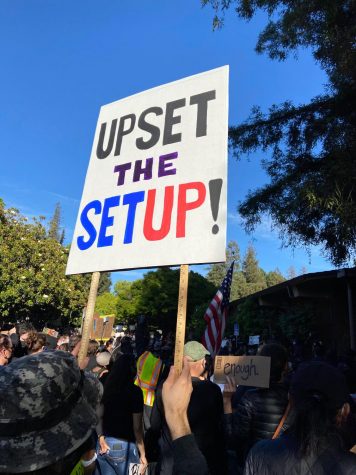The freedom impact
America, informally known as the land of the free. The land where you can forge your own path to success. A land where, with hard work and perseverance, you could earn respect and gain riches.
Whether or not you believed in that view of America, it’s clear to see that when the pandemic struck, it changed everything. COVID-19 ushered in years of cultural change in just a few swift months. The radical transformation of life in America today has brought a compounding series of new difficulties alongside it.
One of the most striking changes was the drawing of a brand new political battleline. Now, a significant portion of the public’s attention is going to one singular question – when do your rights in a pandemic infringe on others’ rights?
The most prominent part of today’s personal freedom question has to do with the wearing of masks. In fact, the issue of wearing masks has become so contentious it is now spanning entire news segments.
Polling shows that the percentage of people who use face masks determines greatly on demographics, and even more so on political affiliation. According to NBC News, polling from July 20-26th, 2020 indicates that 90% of Democrats claim to always or mostly wear masks in public. For Republicans, that number drops to 70%.
Part of the reason as to why the usage of masks became so politicized in America compared to other countries is America’s own failures to listen to their self-made recommendations and previous advice.
Following the anthrax attacks in October of 2001, the Center for Disease Control (CDC) created the Crisis and Emergency Risk Communication guide (CERC). The CERC guidelines were created to avoid the same type of mass confusion and hysteria that Americans faced in 2001.
According to Vox News, the single key point of the guidelines is that there can only be one non-politically affiliated spokesperson for handling information regarding a pandemic, much like COVID-19. This should be someone who’s familiar with the subject at hand and can speak confidently about uncertain topics that come with a deadly virus.
Back in the early days of the pandemic, as far back as February, the COVID-19 daily press conferences held by the White House had no single leader, which often only led to more confusion.
In the press briefings, medical and political figures, like President Donald J. Trump, CDC principal deputy director Anne Schuchat, Dr. Anthony Fauci and more, spoke interegularly and, at some points, even contradicted one another according to Vox News.
Nevertheless, there are scientifically proven methods that one can adopt to help reduce their risk of obtaining or spreading the virus. According to the CDC, wearing a mask, when combined with other safe practices, can help minimize the risk of contracting and spreading COVID-19.
While there is a ton of information regarding what types of face coverings are the best and most effective, the CDC has a list of do’s and don’ts when choosing a face mask.
Do choose a mask that has two or more layers of washable and breathable fabric, that also completely covers your mouth and nose, as well as fits snugly against the sides of your face in order to minimize gaps.
Do not choose masks out of hard to breathe material like vinyl, do not choose masks with exhalation valves or vents as they allow virus particles to escape and do not wear masks intended for healthcare workers, such as N95 masks, respirators, or surgical masks.
Make sure to be cautious about gaiters and face shields, as more research is required to determine their effectiveness.
Other safe practices include, but are not limited to, washing your hands regularly with soap and water for at least 20 seconds, maintaining six feet of distance or two arms lengths away from strangers or sick family members and using a face mask that covers both your mouth and nose when around others.
In fact, the mask debate has become such a point of conflict and division that various people, famous and ordinary have taken to social media to spread awareness of the importance of wearing masks.
In addition to the mask debate, another massive headache afflicting most, if not all U.S. states is the issue of shutting down businesses. For months now, barbershops, salons, bars, gyms and much, much more have been repeatedly shut down.
With businesses being forced to go through multiple stages of closure to semi-closure to fully reopen to closed again, the situation is proving to be a serious challenge for business owners.
The unpredictable nature of a worldwide pandemic, alongside a slew of business closures, has left many feeling dissatisfied with the handling of the pandemic.
To make matters worse, a mismatched patchwork of forced closures on the state, county and even city level has not helped in making the situation clearer. In the end, the outcome was inevitable.
Protests against stay-at-home orders peaked in April before giving way to Black Lives Matter (BLM) protests.
According to AP News, thousands of maskless protesters gathered in the state capitals of Colorado, Utah, Idaho and Washington state on April 19th.
“Hand-washing and staying home if you’re sick are fine — but not closing businesses, said protester Jim Fenimore of Colorado Springs. ‘Every day that goes by is hurting the state,’ he said.”
On April 14th, President Donald J. Trump had the following to say regarding the opening of the state’s economy.
“For the purpose of creating conflict and confusion, some in the Fake News Media are saying that it is the Governor’s decision to open up the states, not that of the President of the United States & the Federal Government,” Trump said in a tweet.
The question about when your rights in a pandemic start to infringe on others’ is still prevalent till this very day. With it having been nearly seven months since the first quarantines started, it remains evident that that very question is bound to remain.
*This article is part of an ongoing series regarding Coronavirus for The Phoenix. In following releases, we’ll go in depth with “impact” articles, each highlighting a different way in which the virus has affected our lives. Stay tuned for more information.*













